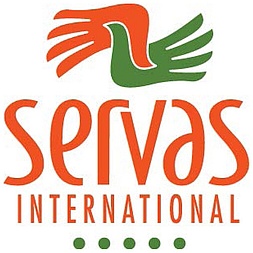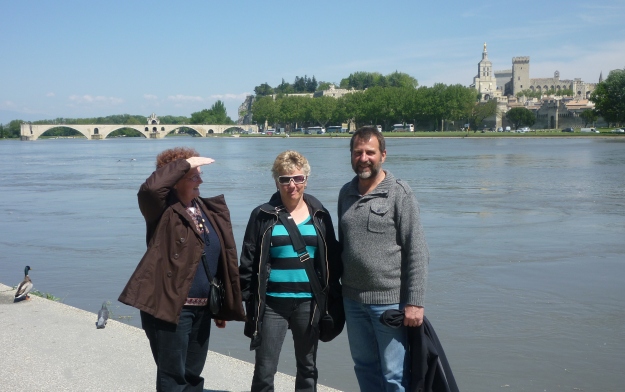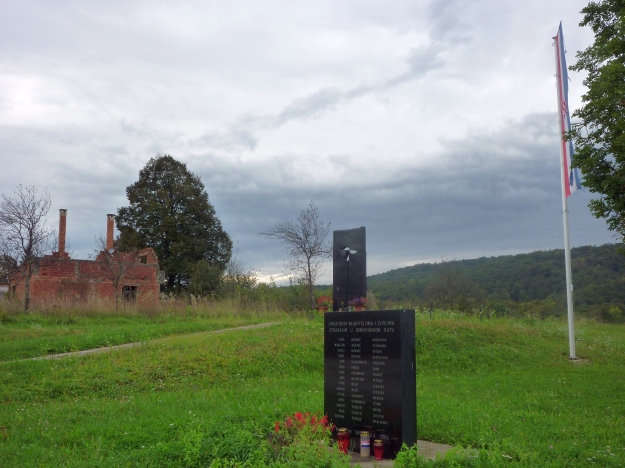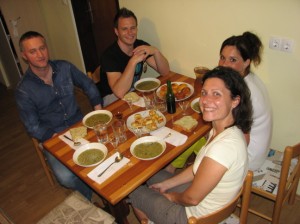For the past few days, I was reminded that, even close to home, one can immerse oneself in cultures that seem very different from one’s own. In this case, I’m not referring to an ethnic culture. In our everyday life, we encounter cultures built around occupations, or interests, or dispositions. Often they have their own specialized languages – sometimes we call them “jargon.”
Visiting such a culture can create an experience very similar to visiting a foreign land: our curiosity is piqued; we have to pay attention to a language we may understand only slightly; we’re trying to understand how they “do things here.” Just like visiting a new place, this can bring presence, aliveness, and excitement.
I hope to be able to write about my recent “trip” before long, but I have not yet processed its many inputs, so it will have to wait. But there are many ways to travel.
I was reminded of an exercise I did a few years ago. I was shown a random photo of an elderly woman standing in front of her barn, and instructed to put myself in her mind. It was a fascinating exercise, and I felt as if I’d traveled to another time and place.
If you want to give it a try, grab a photo somewhere, or use this one. Don’t think about it too much. Just do it. Let me know how it goes.
Meanwhile, here’s what the elderly woman was thinking…
Remembrance Day
Shutter’s broken outside the guest room, Jim. Heard it banging away in the gale last night. Guess you’ll have to take a look if it’s fair tomorrow.
Oh, what am I saying! You’ve been gone these six years now. Won’t likely be doing any more fixing for me, I suppose. If I can’t do anything with it, I’ll have to give Pat a call and see if her Roger can come over with his toolbox.
Haven’t seen so much of Pat and Roger lately. I figure they’ve got other things to attend to. Roger’s fixing up that back bedroom so there’ll be more room at Christmas. You know, they’ve got seven grandkids now. The youngest came just last Spring – cute as a little garden mouse he is. Bit of a handful already, if you ask me. Must have known that when they named him after our Tommy.
Damn! Just spilled tea leaves all over. Let me get a broom and set things right…
He would have been fifty the other night. Our Tommy fifty! Can you believe it, Jim? He would have married that nice girl Selena when he got back. There’d be grandkids. Maybe great-grandkids, cute as that little garden-mouse grandson of Pat’s: a house-full of happiness to keep the memories in their proper place.
I sometimes can’t believe I ever turned fifty myself. But I remember the day like I could smell it. You came in the door with that parcel all wrapped up, and told me we were going to the city for the weekend. Surprised me completely, you did, booking that fancy hotel room down by the river. And it was a beautiful sweater you gave me, even if it was the warmest night of the year. I used to feel you next to my skin when I was wearing it.
But that was a long time ago. I found that sweater in the bottom drawer after you’d gone, when I was cleaning up. I didn’t want to get rid of it, but I figured the memory needed to move on. Besides, it didn’t fit any more.
Some memories won’t move on, though, Jim. Not that I haven’t tried to make them. You remember that crazy song about American Pie that Tommy used to play on the record player all the time? He used to dance around the room – called it dancing, anyway – and sing about Chevies and levees and something about a day for dying. A catchy sort of tune, I guess, though it sure went on. Sometimes, when it gets real quiet here of an evening, I swear I can still hear it playing in the other room.
Got a letter from Pat’s boy Alec the other day. He was going on about some Christmas truce back in World War One. Said for four months, the soldiers on both sides refused to fight. Found they had more in common with each other than with their commanders. Alec wondered how it would have been if he and the other boys had refused to fight. Made me real mad to read that. I didn’t want to write back to him for days.
He’s a good boy, though, Jim. Just wants a future for those little nephews of his.
Alec came back from the War kind of all turned around, you know? Didn’t smile so much – laughed a bit louder than he used to. Started hanging around with those peace groups. I know you thought he was disloyal. God’s sake, maybe we both blamed him for coming back at all!
Wait a minute! I’m so distracted tonight I forgot to plug in the kettle. There! Got it. Now where was I? Oh, yes.
Jim, this is going to be hard. You won’t like it, but you’ve just got to hear me out.
I think Alec’s right, Jim. It wasn’t right what happened. Wasn’t right that Tommy’s life got used up that way. He wasn’t just a means to some do-gooder’s dreams. He was a living, breathing boy of 19, with a whole damn life ahead of him! He never got a chance to move on past 19. He just got stuck there for me. I aged, we aged – and we had to move on. But Tommy couldn’t go with us. I guess that’s what a life stolen from you feels like. All that time, we were growing and changing and tasting life. And Tommy was still singing about American Pie.
What’s that, Jim? Yes, it’s just a little water in my eye. You know, he would have been fifty the other night.
There, see what you’ve made me do! I’ve gone and put too much water in teapot again.
Related Posts:



















